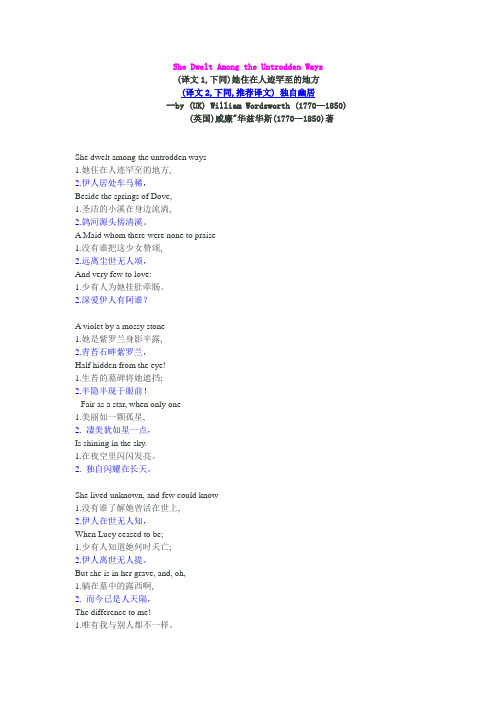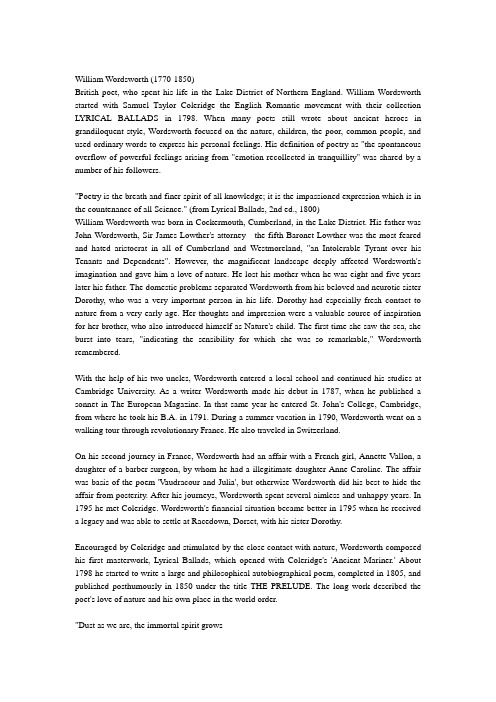Lines Written In Early Spring-华兹华斯(中英文对照)
经典:William-Wordsworth华兹华斯-英国浪漫主义

Features in literature:
英国诗人全都是大自然的观察者、爱好者和崇拜者。 ■对乡村和大海的热爱 ■对高级动物的喜爱和对一般动物世界的熟悉 ■明显的个人独立性,作家们都很有点个人癖性 ■讲求实际的道德观和人生观,与追求正义的强烈意愿 ■英国浪漫主义在发展过程中的各阶段又有着各自的一些特点
■Birthplace: Cockermouth(科克茅斯), Cumberland(坎伯兰郡),
in the Lake District in 1770. ■Orphanage:
at the age of 14. ■Education:
was educated at Cambridge University in 1787. ■Migration:
1770-1850
9
The Lake Poets 湖畔三才子
■ The Lake Poets: William Wordsworth Samuel Taylor Coleridge
(塞缪尔 泰勒 科勒律治)
Robert Southey
(罗伯特·骚塞)
10
The Lake Poets
They had lived in the lake district in the northwestern part of England and shared a community of literary and social outlook in their work.
20
William Wordsworth's influence
华兹华斯的诗歌理论动摇了英国古典主义诗学的统治,有力地 推动了英国诗歌的革新和浪漫主义运动的发展,因而英美评论家将 华兹华斯的Lyrical Ballads《抒情歌谣集序》称为英国浪漫主义的 宣言。
华兹华斯经典诗歌《我孤独地漫游,像一朵云》原文及赏析

华兹华斯经典诗歌《我孤独地漫游,像一朵云》原文及赏析我孤独地漫游,像一朵云我孤独地漫游,像一朵云在山丘和谷地上飘荡,忽然间我看见一群金色的水仙花迎春开放,在树荫下,在湖水边,迎着微风起舞翩翩。
连绵不绝,如繁星灿烂,在银河里闪闪发光,它们沿着湖湾的边缘延伸成无穷无尽的一行;我一眼看见了一万朵,在欢舞之中起伏颠簸。
粼粼波光也在跳着舞,水仙的欢欣却胜过水波;与这样快活的伴侣为伍,诗人怎能不满心欢乐!我久久凝望,却想象不到这奇景赋予我多少财宝——每当我躺在床上不眠,或心神空茫,或默默沉思,它们常在心灵中闪现,那是孤独之中的福祉;于是我的心便涨满幸福,和水仙一同翩翩起舞。
(飞白译)李好摘要:《我孤独地漫游,像一朵云》是英国浪漫主义诗人华兹华斯的代表作之一,因其文笔清新,自然流畅而广为流传。
本文主要从诗歌的韵律,语篇衔接和思想内容三个方面鉴赏此诗。
威廉·华兹华斯(1770-1850)是“湖畔诗人”的领袖,同时也是19世纪英国浪漫主义诗人的杰出代表。
早年他受到法国启蒙主义思想,尤其是卢梭“回归自然”的影响。
英法战争爆发后,他“归隐”湖畔,致力于诗歌创作,并逐渐构建了自己的诗歌创作理论。
《我孤独地漫游,像一朵云》则是他其中的代表作之一,为英国浪漫主义诗歌的创作定下了基调。
[1]华兹华斯与柯勒律治、骚同被称为“湖畔派”诗人。
他们也是英国文学中最早出现的浪漫主义作家。
他们喜爱大自然,描写宗法制农村生活,厌恶资本主义的城市文明和冷酷的金钱关系,他们远离城市,隐居在昆布兰湖区和格拉斯米尔湖区,由此得名“湖畔派”。
华兹华斯认为“所有的好诗都是强烈情感的自然流露”,主张诗人“选用人们真正用的语言”来写“普通生活里的事件和情境”,而反对以18世纪格雷为代表的“诗歌词藻”。
他进而论述诗和诗人的崇高地位,认为诗非等闲之物,“诗是一切知识的开始和终结,它同人心一样不朽”,而诗人则是“人性的最坚强的保护者,支持者和维护者。
中西田园诗歌对比

中西田园诗歌对比作者:李芳来源:《青年文学家》2018年第33期摘; 要:诗歌富含着人类的文化,而与人类关系密切的大自然也是诗人们描写的对象,但是由于中西方文化不同的滋养,中西方诗歌对大自然的描述也存在着较大的差别,本位旨在探讨中西方田园诗歌的差别。
关键词:中西方;田园诗歌;差别[中图分类号]:I206; [文献标识码]:A[文章编号]:1002-2139(2018)-33-0-01万事万物都遵循着大自然的规律,在人类长期的进化和发展历史中,人类通过最初肉眼的观察和亲身的实践逐渐地了解着人类自己,了解着大自然,了解着我们人类和自然的关系。
直到今天我们依然在努力让人类和自然处于一种平衡、和谐的状态。
自然对人类的生活有着深刻的影响,所以自然便成为了作为人类重要文化活动承载形式之一的诗歌的描写对象。
无论是西方的诗人还是中国的诗人,他们都用诗歌表达着自己的情感。
但是由于受到不同的文化背景、美学观念和哲学理念的影响,中西方的田园诗歌有着明显的区别。
1.不同的情感基调1.1中国田园诗歌的悲观中国文人历来受到儒家思想的深刻影响,大多数的诗人认为自己肩负着“天下兴亡,匹夫有责”的重任,承担着光宗耀祖的职责,但现实生活中,能实现自己“治国平天下”的政治抱负和光耀门楣的诗人又能有多少?许多的诗人最终经历的是平生不得志、动荡不安的社会和颠沛流离的人生。
他们转而将自己远大的抱负寄予山水田园。
因此在中国诗人的眼里,自然就带有了萧瑟、苍凉、忧郁的气质。
例如,在杜甫的诗作《登高》中,是这样写的:“万里悲秋常作客,百年多病独登台”;在曹丕的《燕歌行》中,他写道,“秋风萧瑟天气凉,草木摇落露为霜。
群燕辞归雁南翔,念君客游思断肠”;在刘方平的《春怨》中,诗人写道,“纱窗日落渐黄昏,金屋无人见泪痕。
寂寞空庭春欲晚,梨花满地不开门。
”许多这样描写自然的诗歌给人一种悲伤、黯然神伤的感觉,具有一种悲凉之感。
1.2西方田园诗歌的乐观与中国田园诗歌的悲春伤秋不同,西方对大自然描写的诗歌更加的乐观。
She Dwelt Among the Untrodden Ways

She Dwelt Among the Untrodden Ways(译文1,下同)她住在人迹罕至的地方(译文2,下同,推荐译文) 独自幽居--by (UK) William Wordsworth (1770—1850)(英国)威廉"华兹华斯(1770—1850)著She dwelt among the untrodden ways1.她住在人迹罕至的地方,2.伊人居处车马稀,Beside the springs of Dove,1.圣洁的小溪在身边流淌,2.鸽河源头傍清溪。
A Maid whom there were none to praise1.没有谁把这少女赞颂,2.远离尘世无人颂,And very few to love:1.少有人为她挂肚牵肠。
2.深爱伊人有阿谁?A violet by a mossy stone1.她是紫罗兰身影半露,2.青苔石畔紫罗兰,Half hidden from the eye!1.生苔的墓碑将她遮挡;2.半隐半现于眼前!--Fair as a star, when only one1.美丽如一颗孤星,2. 凄美犹如星一点,Is shining in the sky.1.在夜空里闪闪发亮。
2. 独自闪耀在长天。
She lived unknown, and few could know1.没有谁了解她曾活在世上,2.伊人在世无人知,When Lucy ceased to be;1.少有人知道她何时夭亡;2.伊人离世无人提。
But she is in her grave, and, oh,1.躺在墓中的露西啊,2. 而今已是人天隔,The difference to me!1.唯有我与别人都不一样。
2.独有诗客情自迷!She dwelt among the untrodden waysBeside the springs of Dove,A maid there was none to praise她住在人迹罕至的乡野在那白鸽泉边,她是一位少女,无人赞美亦少有人爱怜。
英国文学(二)作家及作品

英国文学(二)作家及作品The Romantic Period1、William Wordsworth(1770-1850)威廉·华兹华斯(1)Lyrical Ballads《抒情歌谣集》Lines Written in Early Spring《早春诗行》Tintern Abbey《丁登寺》The Rime of the Ancient Mariner《古舟子咏》/《老水手之行》(2)Poems on Nature and Country LifeLucy Poems《露西组诗》-She Dwelt Among the Untrodden Ways《她住在人迹罕到的路边》I Wondered Lonely as a Cloud《我好似一朵孤独的流云》=The Daffodils《水仙》The Solitary Reaper《孤独的割麦女》(3)The Prelude《序曲》or Growth of a Poet’s Mind2、George Gordon,Lord Byron(1788-1824)乔治·戈登·拜伦爵士(1)Long Poems*Childe Harold Pilgrimage《恰尔德·哈罗德游记》Don Juan《唐·璜》(2)Byron’s Short Lyrics(nature,love and political aspiration)She Walks in Beauty《她走在美的光彩中》*When We Two Parted《想从前我们俩分手》(3)Other Works*Manfred《曼弗雷德》*Cain《该隐》Hours of Idleness《闲暇时光》3、Percy Bysshe Shelley(1792-1822)珀西·比希·雪莱Queen Mab《麦布女王》The Revolt of Islam《伊斯兰的反叛》Ode to the West Wind《西风颂》Prometheus Unbound《解放了的普罗米修斯》To a Skylark《致云雀》4、John Keats(1795-1821)约翰·济慈Endymion《恩底弥翁》Ode on Melancholy《忧郁颂》Ode on a Grecian Urn《希腊古瓮颂》Ode to a Nightingale《夜莺颂》Ode to Psyche《心灵颂》To Autumn《秋颂》(lyric masterpiece)5、Jane Austen(1775-1817)简·奥斯丁Sense and Sensibility《理智与情感》Pride and Prejudice《傲慢与偏见》Mansfield Park《曼斯菲尔德公园》Emma《爱玛》Northanger Abbey《诺桑觉寺》The Victorian Age6、Robert Browning(1812-1889)罗伯特·布朗宁The Ring and the Book《指环与书》My Last Duchess《我已故的公爵夫人》Home-Thoughts,from Abroad《海外乡思》7、Charles Dickens(1812-1870)查尔斯·狄更斯Pickwick Papers《匹克威克外传》Oliver Twist《奥立弗·特威斯特》The Old Curiosity Shop《老古玩店》Dombey and Son《董贝父子》David Copperfield《大卫·科波菲尔》Bleak House《荒凉山庄》Hard Times《艰难时世》A Tale of Two Cities《双城记》Great Expectations《远大前程》8、(1)Charlotte Bronte(1816-1855)夏洛蒂·勃朗特Jane Eyre《简·爱》Shirley《雪丽》The Professor《教授》(2)Emily Bronte(1818-1848)艾米丽·勃朗特Wuthering Heights《呼啸山庄》(3)Anne Bronte(1820-1849)安妮·勃朗特The Tenant of Wildfell Hall《威尔德·霍的佃户》9、Alfred,Lord Tennyson(1809-1892)阿尔弗雷德·丁尼生勋爵*In Memoriam《悼念》*Idylls of the King《国王田园诗》Break,Break,Break《碎了,碎了,碎了》Crossing the Bar《过沙洲》Twentieth Century Literature10、Thomas Hardy(1840-1928)托马斯·哈代Wessex Novels韦塞克斯小说Far from the Madding Crowd《远离尘嚣》The Return of the Native《回乡》The Mayor of Casterbridge《卡斯特桥市长》Tess of the D’Urbervilles《德伯家的苔丝》Jude the Obscure《无名的裘德》11、Oscar Wilde(1854-1900)奥斯卡·王尔德The Portrait of Dorian Gray《多里安·格雷的画像》Lady Windermere’s Fan《温德梅尔夫人的扇子》A Woman of No Importance《无足轻重的女人》The Importance of Being Earnest《认真的重要》Salome《莎乐美》12、George Bernard Shaw(1856-1950)乔治·萧伯纳Widowers’ Houses《鳏夫的房产》Mrs. Warren’s Profession《华伦夫人的职业》Pygmalion《卖花女》Saint Joan《圣女贞德》13、James Joyce(1882-1941)詹姆斯·乔伊斯Dubliners《都柏林人》A Portrait of the Artist as a Young Man《一个青年艺术家的画像》Ulysses《尤利西斯》Finnegans Wake《芬尼根守夜人》14、Virginia Woolf(1882-1941)(弗吉尼亚·沃尔夫)Mrs. Dalloway《黛洛维夫人》To the Lighthouse《到灯塔去》A Room of One’s Own《一间自己的房间》15、D. H. Lawrence(David Herbert Lawrence)(1885-1930)D. H. 劳伦斯Lady Chatterla y’s Lover《查泰莱夫人的情人》Sons and Lovers《儿子与情人》Women in Love《恋爱中的女人》The Rainbow《虹》。
华兹华斯

The birthplace of William Wordsworth
Hawkshead is still the same tiny village of higgledypiggledy houses, archways, and squares beloved by William Wordsworth and Beatrix Potter. Cars are banned from the village, there being a large car park on the outskirts of the village. Tourism is now the main industry of Hawkshead, with many pleasant inns, guest houses, teashops and gift shops.
“I Wandered Lonely as a Cloud” was a great poet of nature, William Wordsworth was the first to find words for the most elementary sensations of man face to face with natural phenomena. These sensations are universal and old but, once expressed in his poetry, become charmingly beautiful and new. With his pure and poetic language, Wordsworth brings us into a beautiful world where there are daffodils, trees and breeze. We come to realize the great power of nature that may influence our life deeply as revealed in the poem. as we read the poem, we become aware of the poet’s deep love toward nature through his lovely and vivid description about natural things with his figurative language.
华兹华斯传记(英文版)

William Wordsworth (1770-1850)British poet, who spent his life in the Lake District of Northern England. William Wordsworth started with Samuel Taylor Coleridge the English Romantic movement with their collection L YRICAL BALLADS in 1798. When many poets still wrote about ancient heroes in grandiloquent style, Wordsworth focused on the nature, children, the poor, common people, and used ordinary words to express his personal feelings. His definition of poetry as "the spontaneous overflow of powerful feelings arising from "emotion recollected in tranquillity" was shared by a number of his followers."Poetry is the breath and finer spirit of all knowledge; it is the impassioned expression which is in the countenance of all Science." (from Lyrical Ballads, 2nd ed., 1800)William Wordsworth was born in Cockermouth, Cumberland, in the Lake District. His father was John Wordsworth, Sir James Lowther's attorney - the fifth Baronet Lowther was the most feared and hated aristocrat in all of Cumberland and Westmoreland, "an Intolerable Tyrant over his Tenants and Dependents". However, the magnificent landscape deeply affected Wordsworth's imagination and gave him a love of nature. He lost his mother when he was eight and five years later his father. The domestic problems separated Wordsworth from his beloved and neurotic sister Dorothy, who was a very important person in his life. Dorothy had especially fresh contact to nature from a very early age. Her thoughts and impression were a valuable source of inspiration for her brother, who also introduced himself as Nature's child. The first time she saw the sea, she burst into tears, "indicating the sensibility for which she was so remarkable," Wordsworth remembered.With the help of his two uncles, Wordsworth entered a local school and continued his studies at Cambridge University. As a writer Wordsworth made his debut in 1787, when he published a sonnet in The European Magazine. In that same year he entered St. John's College, Cambridge, from where he took his B.A. in 1791. During a summer vacation in 1790, Wordsworth went on a walking tour through revolutionary France. He also traveled in Switzerland.On his second journey in France, Wordsworth had an affair with a French girl, Annette Vallon, a daughter of a barber-surgeon, by whom he had a illegitimate daughter Anne Caroline. The affair was basis of the poem 'Vaudracour and Julia', but otherwise Wordsworth did his best to hide the affair from posterity. After his journeys, Wordsworth spent several aimless and unhappy years. In 1795 he met Coleridge. Wordsworth's financial situation became better in 1795 when he received a legacy and was able to settle at Racedown, Dorset, with his sister Dorothy.Encouraged by Coleridge and stimulated by the close contact with nature, Wordsworth composed his first masterwork, Lyrical Ballads, which opened with Coleridge's 'Ancient Mariner.' About 1798 he started to write a large and philosophical autobiographical poem, completed in 1805, and published posthumously in 1850 under the title THE PRELUDE. The long work described the poet's love of nature and his own place in the world order."Dust as we are, the immortal spirit growsLike harmony in music; there is a darkInscrutable workmanship that reconcilesDiscordant elements, makes them cling togetherIn one society."The winter 1798-99 Wordsworth spent with his sister and Coleridge in Germany. There he wrote several works, including the enigmatic 'Lucy' poems. After return he moved Dove Cottage, Grasmere. In 1802 married Mary Hutchinson. They cared for Wordsworth's sister Dorothy for the last 20 years of life - she had lost her mind as a result of physical ailments. Almost all Dorothy's memory was destroyed, she sat by the fire, and occasionally recited her brother's verses.Wordsworth's second collection, POEMS, IN TWO VOLUMES, appeared in 1807. In the same year Thomas de Quincey met first time Wordsworth and wrote about him and other Lake Poets in several essays. He described revealingly Wordsworth's mean appearance and Dorothy's lack of sex appeal. The frankness of his text, although published in the 1830s and 1840s, was considered indiscreet by later Victorian critics. "... Wordsworth was of a good height (five feet ten), and not a slender man; on the contrary, by the side of Southey, his limbs looked thick, almost in a disproportionate degree. But the total effect of Wordsworth's person was always worst in a state of motion. Meantime, his face - that was one which would have made amends for greater defects of figure." (from Reminiscenes of the English Lake Poets by Thomas de Quincey, 1907)Wordsworth's path-breaking works were produced between 1797 and 1808. In a letter to Lady Beaumont he said: "Every great and original writer, in proportion as he is great and original, must himself create the taste by which he is to be relished." His poems written during middle and late years have not gained similar critical approval. Wordsworth's Grasmere period ended in 1813 when he moved to Rydal Mount, Ambleside, where he spent the rest of his life. His daughter Catherine and beloved son Thomas had died and his friendship with Coleridge, suffering from addiction, was breaking apart. Coleridge did not visit Grasmere, although he had made a trip to the Lake District.Wordsworth was appointed official distributor of stamps for Westmoreland. From the age of 50 his creative began to decline, but tree female assistants took care of him, and filled his life with admiration. Wordsworth abandoned his radical faith and became a patriotic, conservative public man. In 1843 he succeeded Robert Southgey (1774-1843) as England's poet laureate. Wordsworth died on April 23, 1850. The second generation of Romantics, Byron and Shelley, considered him 'dull.' Later the philosopher Bertrand Russell summed up the poet's career: "In his youth Wordsworth sympathized with the French Revolution, went to France, wrote good poetry, and had a natural daughter. At this period he was called a 'bad' man. Then he became 'good,' abandoned his daughter, adopted correct principles, and wrote bad poetry."Dorothy Wordsworth (1771-1855) published travel books and journals, such as GRASMERE JOURNALS 1800-03 and THE ALFOXDEN JOURNAL 1798, in which she described the friendship of Wordsworth and Coleridge. After a serious illness in 1829, she was obliged to lead the life of an invalid, which deeply affected her imaginative and mental powers.For further reading: The Hidden Wordsworth by Kenneth R. Johnston (2001); 1798: The Year of the Lyrical Ballads, ed. by Richard Cronin (1998); The Revolutionary 'I' by Ashton Nichols (1998); Disowned by Memory by David Bromwich (1998); The Hidden Wordsworth by Kenneth R. Johnston (1998); William Wordsworth: A Biography by Hunter Davies (paperback in 1997); William Wordsworth by John Williams (1996); Becoming Wordsworthian by Elisabeth A. Fray (1995); A Literary Guide to the Lake District by G. Lindop (1993); Wordsworth and the Beginnings of Modern Poetry by R.M. Rehder (1981); Wordsworth's Second Nature by J.K. Chandler (1984); A Wordsworth Companion by F.B. Pinion (1984); Life by M. Moorman (1957/1965); Wordsworth and the Human Heart by J. Beer (1978); Reminiscences of the English Lake Poets by Thomas de Quincey (1907) - See also: WALTER DE LA MARE - Museums: Dove Cottage, Town End, Grasmere - former home of William and Mary Wordsworth, closed mid-January to mid-February; Rydal Mount, Ambleside - Wordsworth lived there from 1813 to 1850. Still a family house of his descendants. Closed Tuesdays 1 November to 28 February, and in January; Wordsworth House, open April to October - Suom. Wordsworth: Runoja, 1949 - suom. Aale Tynni, Yrj? Jylh?, Lauri ViljanenSelected works:AN EVENING W ALK, 1793DESCRIPTIVE SKETCHES, 1793THE BORDERS, 1795-96L YRICAL BALLADS, 1798 (with Coleridge)LINES WRITTEN ABOVE TINTERN ABBEY, 1798UPON WESTMINSTER BRIDGE, 1801ON POETIC DICTION, 1802INTIMATIONS OF IMMORTALITY, 1803-06POEMS I-II, 1807MISCELLANEOUS SONNETS, 1807TRACT ON THE CONVENTION OF CINTRA, 1809ESSAY UPON EPITAPHS, 1810THE EXCURSION, 1814THE WHITE DOE OF RYLSTONE, 1815PETER BELL, 1819THE W AGGONER, 1819THE RIVER DUDDON, 1820MEMORIALS OF A TOUR ON THE CONTINENT, 1822ECCLESIASTICAL SKETCHES, 1822YARROW REVISITED, 1835THE PRELUDE, OR GROWTH OF A POET'S MIND, 1850THE RECLUSE, 1888PROSE WORKS, 1896THE POETICAL WORKS, 1940-49SELECTED POEMS, 1959LITERARY CRITICISM, 1966LETTERS OF DOROTHY AND WILLIAM WORDSWORTH, 1967LETTERS OF THE WORDSWORTH FAMIL Y, 1969COMPLETE POETICAL WORKS, 1971PROSE WORKS, 1974POEMS, 1977THE LOVE LETTERS OF WILLIAM AND MARY WORDSWORTH, 1981 THE FIVE-BOOK PRELUDE, 1997 (ed. by Duncan Wu)SELECTED CRITICAL ESSAYS, 1999 (ed. by G.W. Meyer)。
华兹华斯的诗歌

[英国]华兹华斯顾子欣译我好似一朵孤独的流云,高高地飘游在山谷之上,突然我看到一大片鲜花,是金色的水仙遍地开放。
它们开在湖畔,开在树下它们随风嬉舞,随风飘荡。
它们密集如银河的星星,像群星在闪烁一片晶莹;它们沿着海湾向前伸展,通向远方仿佛无穷无尽;一眼看去就有千朵万朵,万花摇首舞得多么高兴。
粼粼湖波也在近旁欢跳,却不知这水仙舞得轻俏;诗人遇见这快乐的伙伴,又怎能不感到欢欣雀跃;我久久凝视--却未能领悟这景象所给带给我的精神至宝。
后来多少次我郁郁独卧,感到百无聊赖心灵空漠;这景象便在脑海中闪现,多少次安慰过我的寂寞;我的心又随水仙跳起舞来,我的心又重新充满了欢乐。
赏析这首诗写于诗人从法国回来不久。
诗人带着对自由的向往去了法国,参加一些革命活动。
但法国革命没有带来预期的结果,随之而来的是混乱。
诗人的失望和受的打击是可想而知的,后来在他的朋友和妹妹的帮助下,情绪才得以艰难地恢复。
这首诗就写于诗人的心情平静之后不久。
在诗的开头,诗人将自己比喻为一朵孤独的流云,孤单地在高高的天空飘荡。
孤傲的诗人发现一大片金色的水仙,它们欢快地遍地开放。
在诗人的心中,水仙已经不是一种植物了,而是一种象征,代表了一种灵魂,代表了一种精神。
水仙很多,如天上的星星,都在闪烁。
水仙似乎是动的,沿着弯屈的海岸线向前方伸展。
诗人为有这样的旅伴而欢欣鼓舞、欢呼跳跃。
在诗人的心中,水仙代表了自然的精华,是自然心灵的美妙表现。
但是,欢快的水仙并不能时时伴在诗人的身边,诗人离开了水仙,心中不时冒出忧郁孤寂的情绪。
这时诗人写出了一种对社会、世界的感受:那高傲、纯洁的灵魂在现实的世界只能郁郁寡欢。
当然,诗人的脑海深处会不时浮现水仙那美妙的景象,这时的诗人双情绪振奋,欢欣鼓舞。
诗歌的基调是浪漫的,同时带着浓烈的象征主义色彩。
可以说,诗人的一生只在自然中找到了寄托。
英文版“I Wandered Lonely as a Cloud”was written by William Wordsworth, the representativepoet of the early romanticism. As a great poet of nature, William Wordsworth was the first to find words for the most elementary sensations of man face to face with natural phenomena. These sensations are universal and old but, once expressed in his poetry, become charmingly beautiful and new. His deep love for nature runs through short lyrics such as “I Wandered Lonely as a Cloud”I Wandered Lonely as a CloudI wandered lonely as a cloudThat floats on high o’er vales and hills,When all at once I saw a crowd,A host, of golden daffodils;Beside the lake, beneath the trees,Fluttering and dancing in the breeze.Continuous as the stars that shineAnd twinkle on the milky way,They stretched in never-ending lineAlong the margin of a bay:Ten thousand saw I at a glance,Tossing their heads in sprightly dance.The waves beside them danced; but theyOut-did the sparkling waves in glee:A poet could not but be gay,In such a jocund company:I gazed --- and gazed --- but little thoughtWhat wealth the show to me had brought:For oft, when on my couch I lieIn vacant or in pensive mood,They flash upon that inward eyeWhich is the bliss of solitude;And then my heart with pleasure fills,And dances with the daffodils.“I Wandered Lonely as a Cloud”is a poem about nature. With his pure and poetic language, Wordsworth brings us into a beautiful world where there are daffodils, trees and breeze. We follow the poet at every turn of his feelings. We share his melancholy w hen he “wandered lonely as a cloud” and his delight the moment his heart “with pleasure fills ”. We co me to realize the great power of nature that may influence our life deeply as revealed in the poem.Edgar Allan Poe once described poetry as “music…combined with a pleasure idea”. In the poem “I Wandered Lonely as a Cloud”, the poet also makes great use of the “music ”of the language to achieve sound beauty in addition to convey meaning. He employs masculine rhyme in “a, b, a, b, c, c” pattern to receive emphasis as a musical effect. (e.g. “cloud” (a), “hills” (b), “crowd” (a), “daffodils” (b), “trees” (c), “breeze” (c) in stanza 1). He also achieves musical quality by the management of alliteration (e.g. “That floats on high o’er vales and hills” in line 2 and “Beside the lake, beneath the trees” in line 5) and assonance (e.g. “beneath the trees in line 5” and “ They stretched in never-ending line” in line 9) and consonance (e.g. “ vales and hills” in line 2 ). Besides the repetition of sounds, the poet also makes his poem a strong appeal for us in languagethat is rhythmical. He arranges his poem in lines of iambic tetrameter in the main with alternation of iambic trimeter.( e.g. I wandered lonely as a cloudThat floats on high o’er vales and hillsWhen all at once I saw a crowdA host, of golden daffodilsBeside the lake, beneath the treesFluttering and dancing in the breeze )He slowed down the tempo in line 4 to keep in accordance with his bated breath the moment he glimpses at a host of golden daffodils thus convey to us the poet’s intoxication in the face of nature. With all these musical devices, Wordsworth secures a songlike effect of his poem in addition to communicate his emotion and meaning.An old saying goes “There are pictures in poetry and poetry in pictures”. It finds its most eloquent examples in most of the Chinese Tang poems that present the readers with beautiful pictures. In the poem “I Wandered Lonely as a Cloud”, the poet also seeks to express his emotions by providing the sense impressions he has through imagery. He depicts a picture in which “a host of golden daffodils (visual imagery) fluttering and dancing in the breeze” (kinaesthetic imagery) so vividly that it appeals richly to our senses and to our imagination.Wordsworth, in the poem, also employs figurative language to evoke not only the visual effect but also the emotional response. (e.g. in line 1, the poet makes a comparison between “I wandered lonely”and “a cloud”by the use of simile, thus convey to us his lonely and melancholy mood with the image of “cloud”. In line 7, he also amplifies the visual effect by the use of another simile “Continuous as the stars that shine…” to evoke our sense of “daffodils” with the image of “stars” twinkling on the milky w ay which is familiar to us all. He goes further to impress us with the image of countless daffodils with an overstatement in line 9 “They stretched in never-ending line”). Besides, natural things are also endowed with human being’s characters by the poet’s subtle use of personification. (e.g. “Tossing their heads in sprightly dance” “The waves beside them danced”) therefore, as we read the poem, we become aware of the poet’s deep love toward nature through his lovely and vivid description about natural things with his figurative language.What’s more, Wordsworth goes further to communicate his emotion and meaning by his thoughtful tone. The choose of the word “lonely”in “I wandered lonely as a cloud”instead of other words like carefree, leisure or jolly convey to us the poet’s depression and disconsolateness at the very beginning. But as he catches sight of daffodils stretching as far as the eyes can see and finds himself in the midst of nature, his loneliness turns into relaxation and joy. Thus the shift of the poet’s mood from sadness to happiness manifests the theme --- the great influence of nature upon human being.孤独割麦女青年英国威廉?华兹华斯1770-18501孤独站在麦田里,窕窕少女收割忙,边割边唱无休止,我把姑娘细端详,过路的人要静悄悄,不要把她来打扰,少女唱出海豚音,宇宙充满天籁声。
- 1、下载文档前请自行甄别文档内容的完整性,平台不提供额外的编辑、内容补充、找答案等附加服务。
- 2、"仅部分预览"的文档,不可在线预览部分如存在完整性等问题,可反馈申请退款(可完整预览的文档不适用该条件!)。
- 3、如文档侵犯您的权益,请联系客服反馈,我们会尽快为您处理(人工客服工作时间:9:00-18:30)。
赏析:
威廉·华兹华斯(1770-1850)是英国19世纪著名的浪漫派诗人,他对自然的热爱以及他大部分人生所度过的地方-----湖区的湖光山色对他的性格和作品有着深远的影响。
《早春诗行》描写了诗人坐在树荫下享受大自然美景的情景。
诗中三,四和第五小节描绘了一幅欢乐的“花鸟树草”图。
诗人虽然无法知道樱草花,常春藤,鸟儿和花蕾有何真实感受,但从花儿鲜艳的色彩和鸟儿欢快的叫声中,他感受到世间万物都在享受大自然的清新和美丽,每一个姿态和动作都展示它们正在迸发的兴奋和快乐。
在这样欢乐的气氛中,诗人本应投入大自然的怀抱,尽情享受自然的美丽,然而,在这充满春的欢乐的季节里,诗人想到的却是“人怎样对待着人”。
从万物的欢乐中,华兹华斯想到了人间的痛苦和悲伤。
他认为,人本为大自然的一部分,理应加入大自然欢乐的海洋,但是人间的情况却不是如此,是人类自身造成了人间的痛苦和悲伤。
诗歌含蓄地表达了作者对世间不平的抗议和对公平社会的渴望。
